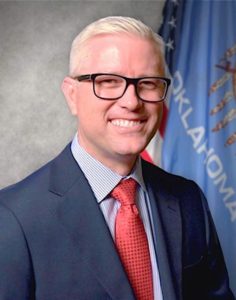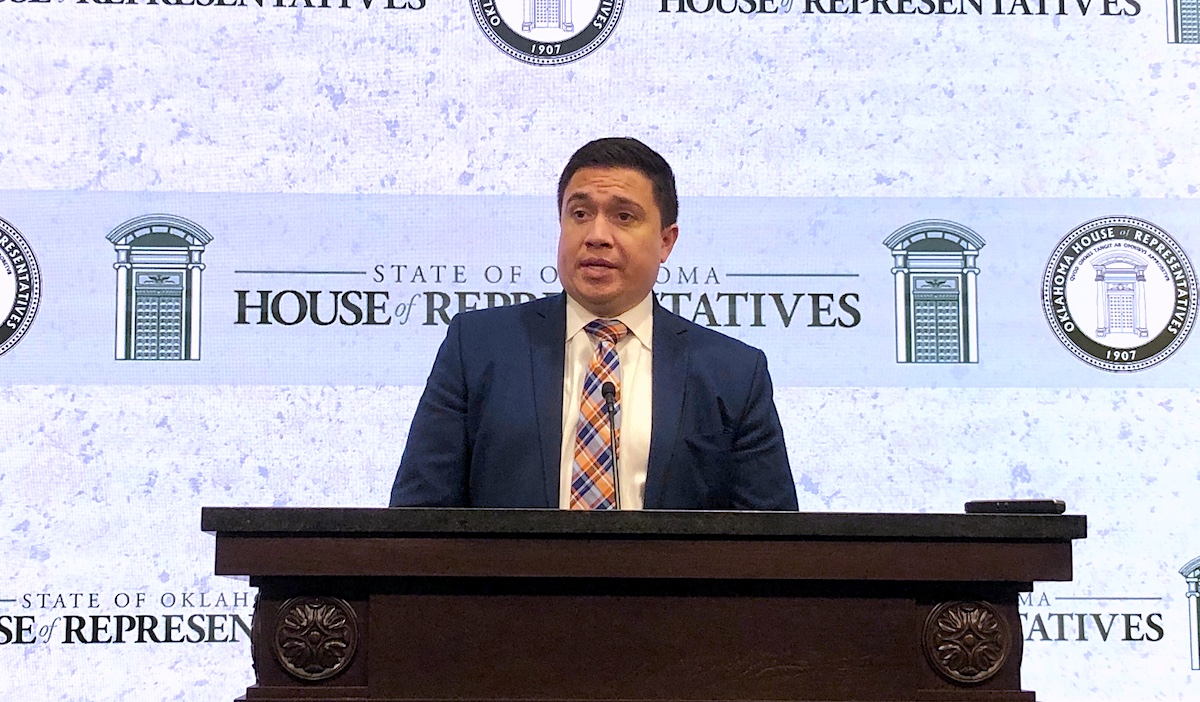
Steven Harpe, the executive director of the Office of Management and Enterprise Services, testified Monday before the Oklahoma House’s Special Investigative Committee regarding the state’s deal with Swadley’s Foggy Bottom Kitchen. Harpe that he was unaware of the Tourism and Recreation Department’s contract details with Swadley’s until more than a year after it was signed.
Harpe, who was unable to appear at the committee’s previous hearing in May because he was on his honeymoon, testified for about two hours.
The committee is examining the OTRD’s contract with Swadley’s Foggy Bottom Kitchen, which operated restaurants at state parks before the $16.7 million contract was terminated amid allegations of misuse of taxpayer funds through fees and other items Swadley’s billed the state for while serving as general contractor during the restaurants’ construction.
According to its website, OMES is “state government’s backbone.”
“Agencies turn to us for the finance, property, human resources and technology services they need to succeed,” the site states. “We’re a trusted, credible partner providing the business expertise that makes Oklahoma government work.”
Among the biggest revelations in Thursday’s hearing was that Harpe said he was unaware of the contract until long after it had been signed. Harpe became OMES executive director in January 2020.
“As far as the time frame of the contract, OMES wasn’t made aware of the contract until late March 2021, and the contract went in in February or March of 2020,” Harpe said.
Harpe said OMES only became aware of the unusual nature of the contract after an amendment to it, allowing Swadley’s to make purchases on their own without state oversight, in late 2021.
‘They never actually presented OMES with a contract’
Rep. Meloyde Blancett (D-Tulsa) asked Harpe who had the responsibility to approve reimbursement of purchases requested by Swadley’s through their contract with the Tourism Department.
“That’s the executive team at OTRD,” Harpe said. “When we’re talking specifically about Swadley’s, they used — they meaning Tourism — they actually never presented OMES with a contract to review.”

Harpe, who also serves as the state’s chief operating officer, said the OTRD did not follow typical procedures when approving purchases for Swadley’s. He said OTRD cited three statutes for not using typical purchasing procedures, though he was unable to recall which specific statutes were referenced.
“Because of the statutes, they used those as a mechanism to say, ‘Hey, they have the ability and authority to act on their own,’ and therefore they weren’t using central purchasing like most state agencies were,” Harpe said.
OMES chief financial officer Ashley Plyushko said agencies’ invoice payment approval process is something OMES’ has little involvement in.
“So basically, it starts out with the agency,” she told the committee. “Basically, the approval of the invoice happened inside the agency. I’m not sure if Tourism is on what we call AP Workflow, which is electronic if they have a separate system, but they should have a system that flows through where appropriate levels of authority validate that and say it’s a valid invoice. Once that happens, it’s sent to OMES, but we’re the transaction process. We’re basically just computing the numbers (and) making sure they are given to the central accounting system.”
Terse exchange between Martinez, Harpe

While Monday’s hearing lacked the revelations of expensive cheese melters and overpriced floor tiles that the May hearing featured, it did include a terse exchange between committee Chairman Ryan Martinez (R-Edmond) and Harpe.
At one point, Martinez questioned whether Harpe and OMES had fully complied with the subpoena sent to him by the House committee for the May meeting. Throughout Monday’s hearing, Harpe mentioned several times that he wasn’t able to answer questions from legislators without further research.
“Are you suggesting you met all of the requirements of that subpoena?” Martinez asked.
“Yes,” Harpe said.
Martinez said that did not appear to be the case.
“So given the subpoena, you’re still not able to answer the questions that I asked earlier,” Martinez said. “Around budgeting, around the Department of Tourism? Monthly ledgers for accounts from July 1, 2019, to the current date? I think someone was asking questions about that earlier. (…) The list of things your team said they were not prepared to answer would suggest you’re not complying with the subpoena we sent you for the second time now. Is that true or false?”
Harpe said OMES had provided 11,000 documents to comply with the subpoena.
“You might have provided documents, but you’re not able to discuss any of these issues or answer any questions around the documents,” Martinez said in response. “When can this committee expect you to be prepared to discuss those documents specifically?”
Harpe said he was unable to go through all 11,000 documents before the hearing, adding that OMES provided documents that may or may not be germane to the committee’s work.
“Out of 1,006 employees at OMES, there’s not somebody that has any idea to look through the germane-ness of those documents?” Martinez asked.
Harpe said some of the OMES legal staff went through the documents but that it didn’t necessarily make them knowledgeable about the content.
“It seems like there is a lack of knowledge on contracting, on things that are happening,” Martinez said in response. “There’s no accountability. That’s clearly what has happened with the Department of Tourism. Herein lies the problem. We’re relying on systems but no human to look over a budget that is way over or a questionable invoice or contract. I think this reiterates the issue we’re having. That’s not a question, so I don’t expect an answer.”
Martinez concluded the exchange by telling Harpe he can be expect to be called before the committee again.
Previously
LOFT: Swadley’s contract included inconsistencies, bloated expenses





















